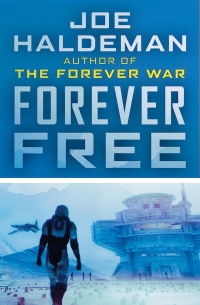Forever Free by Joe Haldeman
 Sunday, February 19, 2017 at 8:15AM
Sunday, February 19, 2017 at 8:15AM 
First published in 1999; published digitally by Open Road Media on September 27, 2016
Forever Free, unlike Forever Peace, is a direct sequel to The Forever War. It isn’t as poignant as The Forever War, but few books are. While it has a smattering of powerful moments, it is nothing like its predecessor.
After the Forever War ended, veterans and others went to Middle Finger where they were allowed to live as insurance against the possible failure of cloned perfection, an experiment called Man that has produced billions of humans, all communing with a group mind. William Mandella, a natural human who starred in The Forever War, is now 1,168 in Earth years, but still in his 30s physically thanks to relativity and all the interstellar traveling he did as a soldier.
Mandella and his wife Marygay think of themselves as prisoners, preserved as part of a natural genepool but given no authority on an arctic planet that is effectively ruled by Man. They decide their best option is to gather a bunch of humans and take a five-year trip to the stars, then turn around and (thanks to relativity) return 40,000 years later. They are surprised to learn that Man is only too happy to get rid of them. The trip will keep the genepool intact while assuring that the troublesome humans don’t bother them for 40,000 years.
Before the trip can begin, Charlie receives an ominous warning from an unidentified Tauran (the alien enemy humans fought in the Forever War). From that point on, strange things happen, disappearances of matter (and then people) that seem to defy the laws of physics. Not all of the events strike me as being logically consistent, but logic turns out to have little to do with the story.
Forever Free isn’t military science fiction. It isn’t space opera. It’s sort of a first contact story, but not really. For a while, it is sort of a survivalist story, although it isn’t the kind of modern survivalist story in which paranoid whackos lovingly describe their guns and bugout bags while eagerly waiting to shoot their neighbors after a mass disaster. This could have been a decent story about survivors working cooperatively to rebuild a society (cooperation being a concept that never occurs to the whackos who sleep next to their bugout bags), but that plot thread, like all the other interesting subplots in the novel, dies out before it develops.
At its heart, Forever Peace is a science fiction mystery, the mystery being, what’s going on with all the disappearances? The answer to the mystery … well, I was disappointed. Readers of a different philosophical persuasion might find it satisfying but, judging from Amazon reviews, readers who are hostile to religious belief systems consider Forever Peace one of the worst sf books ever written. That’s consistent with many Amazon reviews I’ve read by sf readers who are viciously intolerant of any belief system to which they do not adhere. Intolerance, to me, seems antithetical to the idea of science fiction, which should teach readers to be open minded. I have no religious beliefs and therefore do not share the belief system that drives the novel’s ending, but the book isn’t as bad as many one-star Amazon reviews make it out to be. Other sf authors, however, have covered the same territory more creatively, including Philip K. Dick and Arthur C. Clarke and even Isaac Asimov.
In the end, Forever Peace tosses out too many ideas and tries to be too many things, preventing it from developing any one theme successfully. The ending is a little too easy, almost lazy in its execution. Other aspects of the story are interesting, but it doesn’t work well enough as a whole to merit my recommendation, making this the only Joe Haldeman novel I can’t recommend.
NOT RECOMMENDED
Reader Comments